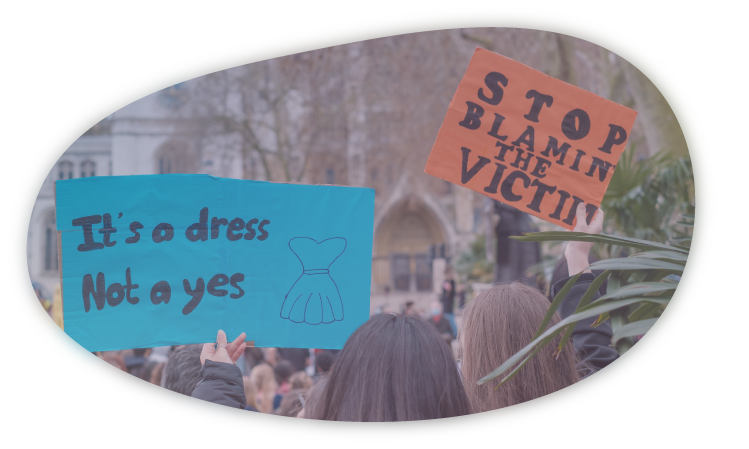The effects of trauma can be influenced by many different internal and external factors, so what you may be feeling will vary significantly from another person. All feelings after sexual trauma are valid.
Studies show that between 17% and 65% of women who were sexually assaulted in adulthood exhibit symptoms of post-traumatic stress disorder (PTSD).
Post Traumatic Stress Disorder can develop following a traumatic event and is diagnosed by a physician. The symptoms of PTSD can be categorized physically and psychologically.
Physical symptoms
Psychological
Kristen R. Choi, PhD, a registered nurse and researcher at UCLA who studies trauma explains that trauma is different for everyone, but two of the more common reactions are feeling very strong emotions or feeling little.
You might have overwhelming negative emotions or not be able to stop crying. On the other hand, you might feel numb and unable to experience pleasure or pain.
It is also not uncommon to feel guilty or ashamed after trauma has sunk in. For example, you might think you didn’t react the way you should’ve. That’s normal, but if those feelings linger for more than a few weeks, you should look for help.
On the other hand, you might behave in unexpected ways after trauma. For example, some people engage in more risk-taking behaviours, which might seem unusual, especially if you’ve just survived a situation where your life was in danger, but it’s a normal reaction.
“If you feel like the trauma you experienced is making it hard for you to live your life — for example, do your job, experience pleasure, or have healthy relationships — it can be a good idea to seek professional help”
Kristen R. Choi
A first step you can take is to acknowledge that you’ve gone through trauma and accept that your emotions might be affected. After that, you can consider reaching out to a healthcare professional. They may be able to provide resources to help you feel better.
National Sexual Assault Hotline 800.656.HOPE (4673)
RAINN online.rainn.org
Crisis Resources https://www.camh.ca/en/health-info/crisis-resources
Gaslighting is an extremely common form of emotional abuse and manipulation used to make a survivor second guess their experience and memories. Many tend to feel like they are losing touch with reality when being gaslighted, and believe they can’t rely on their own personal memories. A common phrase an abuser may say is, “Oh no, this is what really happened.” In turn this common statement can actually make a survivor believe that they are forgetful and can become blind to the abuse they’ve endured or are enduring.
So, you may be wondering how sexual violence comes into play with gaslighting. In reality, it’s an extremely common tactic used to invalidate survivors on their experience, making them question reality. While gaslighting can be done by the abuser, it can also be reinforced by a friend or family member who doesn’t believe your story. Survivors of any kind of abuse need support, and without it, they can fall further down a rabbit hole of not seeking guidance and endure the mental effects of gaslighting.
If you’re in a sexually, emotionally or physically abusive relationship your partner can deny, or downplay abuse that occurred if you confront them. In some cases, they may add details that are false, with the intent of confusing you. This is also common if survivors choose to confront or approach their abuser about what took place even if they are not in a relationship, or have little connection to one another. They may avoid or refuse to have an open discussion about what took place. Here are some common phrases they may say when gaslighting.
Our close family members and friends are meant to be people we can confide in and seek support from in times of need. Individuals often turn to these figures in hopes of having a safe space to vent. It can be extremely upsetting if one of these trusted individuals invalidates your abuse. It can make it far more challenging to seek out help when this occurs and makes survivors choose silence rather than guidance or justice.
Here are some common phrases others may tell you if you’re being gaslighted:

Gaslighting is an attack on your memory, your intelligence and ability to convey reliable information. If that’s constantly being questioned, it is bound to have an affect on your self-confidence. This can include fearing making decisions, doubting yourself, or constantly seeking the reassurance of others in order to know that you aren’t imagining something. Constantly apologizing and stepping on eggshells around others, can also happen when you’re questioning your self-confidence.
If you have no one to confide in and are constantly accused of lying, the result can be a very isolating and lonely existence. You may believe you’re going crazy and have no resources besides the individual who has made it a goal to brainwash you.

If you’re in a constant state of self-doubt, you can imagine the anxiety that may play out in day-to-day situations. It can become hard to trust others, and you may come to believe that you’re the bad guy even though that’s not true. Fearing that you’ll upset others or convey invalid information could be extremely stress-inducing.
Gaslighting can create feelings of despair, hopelessness, and low self-confidence which was discussed above. All of these feelings can contribute to developing depression.
It’s important for you to learn how to once again follow those gut instincts and inner intuition. Oftentimes, those feelings we get are trying to protect or warn us. Gaslighting tears down your sense of reality, leaving many in a confused like state. When you learn how to trust your memories, your experiences, and not rely on the negative and untrue beliefs others plant in your mind, you will soon rebuild that confidence. A great way to do this is by using mindfulness. This can be done during mindful eating (i.e knowing when you’re full), or mindfully listening to others when they speak and becoming self-aware by acknowledging negative thoughts and letting them pass. This ultimately involves becoming more present in the world around you.
When someone gaslights you they are tearing down your memory and picking at your flaws, in order to make you as confused and disillusioned as possible. The words we hear around us have a major impact and when you’re constantly told that you’re forgetful or that your memory is tainted, your subconscious mind may soon believe that. Positive affirmations can help reframe those negative thoughts planted in your mind. You can either write your affirmation on paper or say it out loud. Here are some affirmations that could be helpful during your healing process.
Gaslighting can make it difficult to make even the smallest decisions, as you have this fear of messing up, or that you’ll be wrong. Learn to become decisive as this will not only increase your confidence but will also give you more control over your life. The more you do this, the more you’ll get used to it and eventually trusting yourself to make decisions will become second nature. You can start small by simply ordering dinner, or choosing a new television show to watch and eventually build your way up to more serious decisions.
While being able to validate and spend time with yourself is crucial, it is just as important to have an outlet or support system where you can express yourself. Bottling emotions up can lead to negative consequences, so finding a friend, a family member or therapist is very beneficial. If none of these things are accessible to you, perhaps trying 24/7 hotlines could be an option. While it may not be a first choice, they are free, anonymous and sometimes you need to speak with someone who is not a part of your immediate family and friends. If you’re not ready to open up, journaling is an excellent way to begin expressing your inner emotions. Check out our blog post on journaling here
I hope this article has helped you even in a small way. If you’re currently in an abusive relationship, we understand how challenging it can be to leave. It can be very scary, and may feel as though staying is the safest possible option. However, you can absolutely reclaim your life and leave this relationship. Below we’ve included some resources that can better guide you during this process. If you’re in immediate danger call 911.
Sources:
https://www.womenshealth.gov/relationships-and-safety/domestic-violence/leaving-abusive-relationship
https://www.yourtango.com/2019327022/how-gaslighting-emotional-abuse-affects-sexual-assault-survivors
www.medicalnewstoday.com/articles/gaslighting
https://www.psychologytoday.com/ca/blog/here-there-and-everywhere/201701/11-warning-signs-gaslighting
Written by: Taryn Herlich
Guest blog from Metta Space
In a recent U.S. survey, 55% of male respondents were more concerned about false reports on sexual harassment than the present discrepancies in the gender pay gap.
This shows that the majority of concerns rather centre on false claims of harassment and/or abuse than towards women actually experiencing such degrading situations.
Zooming in to the official data in the United States, false reporting is statistically quite rare and low regardless of the type of crime committed. For sexual harassment cases, false reporting ranges from 2 to 10%, which is a lower rate to those for murder and kidnapping.
As the statistics stand then, men are actually more likely to be sexually assaulted and/or killed by other men than being falsely accused of sexual harassment and discrimination by a woman.
With the explosion of the #MeToo movement, those affected by sexual harassment and discrimination in the workplace, especially women, have been offered a safe and open space to share their respective experiences and raise awareness on these (unfortunately) still widespread and common practices within the work environment.
As any movement trying to raise their voices on social issues #MeToo had, and still has, its trail of doubters trying to undermine its legitimacy and purpose. Their favourite argument being that it prompts and favours the development of false reports due to a “misinterpretation of common kindness as sexual come-ons”, which are exaggerated and transformed into something that can have significantly serious consequences on someone’s reputation.
Without denying the fact that false reports in sexual harassment cases can happen and do exist, it is important to note that the media (and misogynists) tend to overestimate false accusations and might shed light on the wrong issue, due to confusions on what behaviours constitute sexual harassment in the first place.
But: Are these claims considered false because they don’t rise to the legal (or common) definition of what sexual harassment is or are they really fabricated?
In our previous article, we discussed and showed how people’s misconceptions about what constitutes sexual harassment can play a significant role in the maintenance of institutional sexism and discrimination in the workplace, especially towards minority groups like women or those from the LGBT community.
Because if we think about sexual harassment, we can all agree that when someone grabs another person’s genitals or even threatens to not promote them without sexual favours, it is a pretty straightforward form of sexual harassment.
However, some might not consider subtle comments and jokes about someone’s physique or personality, or even being stared at, as forming part of sexual harassment — when actually, it does.

In a study made by the Metta Space Team, only 57.6% of respondents considered the latter situations (jokes, comments, staring) sexual harassment, showing that it is rather the physical and direct interactions that are generally thought about when defining sexual harassment.
Thus, due to the inherent disagreement about the definition of sexual harassment, and the evident ambiguity on whether these types of incidents constitute sexual harassment, these types of “grey areas” may impede the target when trying to report the harasser.
Due to this fine grey line, cases therefore could be, and often have been, considered invalid just for reasons of discrepancy in the definition of what actually constitutes sexual harassment. They have for that reason, been considered to be false reporting.
False reporting, however, is a myth. And you might ask yourself why that is.
For a report to be considered false, someone first needs to make one. And already here, only around 7% of those who have been harassed actually report it, for the simple reason that they do not feel comfortable nor safe undertaking these steps.
In a recent survey focusing on sexual harassment in the tech industry, 39% of those who were sexually harassed decided not to report by fear of retaliation and 30% decided not to report due to their willingness and desire to forget about the incident.
These results show that reporting is still a step that those affected by sexual harassment do not take by fear of reprisals or negative impact on their reputation and professional career.
Yet, the perpetuation of this myth can create unfavourable conditions to improve and develop better processes and policies at the national and company-level to investigate claims of sexual harassment.
When Donald Trump Junior explained that the #MeToo culture made him “worry more for sons than daughters”, it showed us that there is still a lot of work to be done to shift the interest on real issues: gender pay gaps, unconscious gender biases, institutionalized sexual harassment.
This culture of blame shifting, and the myth of false reporting provides male-dominated industries with the perfect conditions to perpetuate the exclusion of women in the professional field by fear of potential reputational damages.
But, men are actually valuable and important allies in the fight against the perpetuation of institutional sexual harassment and provide essential opportunities for connections and networking to grow professionally.
Women cannot do it alone. Through the promotion of the false reporting myth, men are more likely to further exclude women from key events that could help their careers and rather, create a proliferation of doubt over their claims — further perpetuating the silent treatment experienced by those targeted by sexual harassment.
The increasing claims that false reporting is on the rise and the current focus of mainstream media on this myth only promotes the shift towards drawing the attention away from the issue that actually needs to be addressed: sexual harassment.
The reality is that, despite the #MeToo and #TimesUp movements, women are still falsely being greeted with suspicions in relation to their reports of sexual harassment. And this in turn does not only encourage them not to speak up about abuses that they have witnessed and/or experienced in their workplace, but shifts the conversation away from how to change sexually harassing behaviour.
This false reporting myth needs to be shattered to stop the perpetuation of institutionalized sexual harassment and sexism in the workplace and finally provide a safer and more inclusive working environment for all.
Written by: Diane Valat, Research Ambassador at Metta Space
Edited by: Paula Koller-Alonso, Head of Research & Development at Metta Space
Legal Disclaimer:
Our website provides general information that is intended, but not guaranteed, to be correct and up-to-date. The information is not presented as a source of legal advice. You should not rely, for legal advice, on statements or representations made within the website or by any externally referenced Internet sites. If you need legal advice upon which you intend to rely in the course of your legal affairs, consult a competent, independent attorney. Vesta Social Innovation Technologies does not assume any responsibility for actions or non-actions taken by people who have visited this site, and no one shall be entitled to a claim for detrimental reliance on any information provided or expressed.
It’s important that we talk about sexual assault and how it affects men. Our culture of toxic masculinity makes it extremely difficult for men to seek help. They often fear being shamed and believe they will be seen as “less of a man” if they come forward. Certain myths around men and sexual assault have also created a stigma. For example, stating that “only gay men can be sexually assaulted” is just one of the many false narratives surrounding men and sexual assault. This is why it is important to talk about supporting men who have been sexually assaulted.
Although no survivor reacts in the exact same way, we must acknowledge that the way men react to sexual violence can be different from the way women do. While common mental health effects for all survivors can be PTSD, anxiety, depression, self-blame, anger, and sadness, some reactions are distinctive for male survivors. For example, many feel as though they should have been able to better protect or avoid this situation, because of their given gender stereotypes of always being indestructible. If they were aroused (which can happen during sexual assault), they may question their sexuality and act out promiscuously (e.g if perpetrator was a man they may pursue an extensive amount of sexual relationships with women). This can be caused by consciously or subconsciously trying to prove to themselves and even others that they are straight. As we explained earlier, many men are taught to hide emotions of defeat or sadness, and they may not acknowledge what took place or they may actively block it out. Men are more inclined to minimize what happened to them, which can manifest in avoidance of guidance and support. Male survivors must know that being sexually assaulted does not determine your sexuality, does not make you less of a man, is in no way your fault, and definitely shouldn’t excuse you from seeking the help you deserve. It can happen to anyone of any gender or sexuality.
It’s crucial that our society learns how to better support male survivors, and use a non-judgmental approach. Below are a variety of tips on how to navigate this process.
It’s extremely hard for many men to share a traumatic experience like sexual assault. It’s critical that you don’t question or invalidate their experience by victim-blaming. Show that you believe them, and avoid questioning in a manner that appears judgmental. Instead, say phrases like “I want you to feel comfortable to share whatever you want with me. But please know that there’s no pressure to tell me everything.” This will allow the survivor to lead the conversation and feel in control rather than feeling like they have to disclose something they are not ready or willing to share.
Remember, listening can go a really long way. Sometimes people want a person they can vent to rather than receive advice. Of course, it’s different if they actively ask for guidance but if they don’t, just be a person who will listen and let the survivor express themselves clearly. You can respond to their story by saying phrases like…
We often use examples from our own lives to make our friends or family feel better. This can help, but when someone is venting about a very traumatic and sensitive topic, more often than not, they don’t want to veer away from their issue. You can always ask if they’d like to hear a quick story because this can help others feel less alone. Try to be mindful and make actively listening to the survivor a number one priority.
People can sense judgment through body language and tone of voice. It’s important to come to the survivor in a non-judgmental and unbiased manner. Since men are more inclined to bottle up their emotions, they may be told phrases like “Toughen up” or “Are you sure you were assaulted?” as there are fewer male survivors than women. Instead, say, “I can imagine the pain you must be going through and want to be here for you.” It takes a lot of courage and bravery for someone to disclose sexual assault. This person has experienced a lot of trauma, and if approached in an insensitive manner, they will be less inclined to seek justice or support for mental health.
After a sexual assault, being touched and even hugged can become a grey area. We know that many people may express their empathy through touch but keep in mind that it can be triggering for a survivor now. Ensure that you always ask before hugging and if they say no, do not pressure them or question why.
Finding resources specifically geared towards male survivors can be challenging. We want to ensure that you have resources to help yourself or a fellow survivor seek support. Below we’ve provided you with Canadian resources for information, counselling, and legal services.
Written by: Taryn Herlich

Male Survivors of Sexual Abuse – Family Services Toronto (must be 16 over to use service)
https://familyservicetoronto.org/our-services/programs-and-services/male-survivors-of-sexual-abuse/
Webinars, Support Groups, Forums, Chats
https://malesurvivor.org/for-survivors/
1in6 Informational Website (confidential hotline and chat room with professional)
https://1in6.org/
Legal services for youth under 18 and homeless youth under 25
https://jfcy.org/en/
Ontario Men’s Support Services
https://www.attorneygeneral.jus.gov.on.ca/english/ovss/male_support_services/
Support for male survivors of childhood sexual abuse (within all of Canada)
http://cc4ms.ca/resources/
Canadian Resource Centre For Victims of Crime (scroll closer to the bottom to find men’s resources)
https://crcvc.ca/links/
Resources
https://www.rainn.org/articles/sexual-assault-men-and-boys
Men and Sexual Assault | AASAS
Understanding how to support a friend who has been sexually assaulted can be challenging for many. We can say that “we understand how they feel” but in reality, we don’t. This is because trauma affects everyone in their own unique way, causing us to struggle with knowing what the “right” thing to say or do is, even if we too, experienced something similar. However, there really isn’t one linear way you can support your friend. Everyone heals differently, and can experience a variety of responses to trauma. Some may want you to check in on them, while others prefer that you don’t bring up what took place until they are ready to talk about it. The first step is to acknowledge those differences, and be there as a friend they can lean on, while also keeping your own mental health in mind.
Below are some helpful tips on how to support your friend who has been sexually assaulted.
It’s important that you don’t pressure your friend into handling what they went through the way you believe is best. For example, many survivors may not feel comfortable or ready to report what took place. You have to respect their wishes, and refrain from pressuring them to come forward. That is their decision and they will do what’s best for them. Talking about the trauma could cause them to relive those memories. You must be patient with your friend, rather than nag or pressure them which will only force them to relive their trauma. In other cases, be mindful of touch. Ask before you hug, as that could also be a trigger; it may feel as though their personal space was again violated. At the end of the day, your friend has to be the one in charge, not you. They will do what is best for them, but will be grateful for your support.
No one wants to feel judged. It can be an awful feeling if your friend regrets opening up to you after they shared something so personal. They may be scared to confide in anyone else if someone who they see as a close friend, judged a traumatic experience. Certain things that may appear judgmental could be questioning their memory, their judgment, asking them what they wore, if they were under the influence of drugs or alcohol, or saying that it could have been worse. Your friend wants your support. They don’t want to be questioned after opening up about something that changed their life. Be aware of what you say and how you respond to your friend’s story. We’re humans and sometimes we don’t know how to respond, and accidentally say the wrong thing. What’s most important is that you learn from those encounters, and acknowledge how you can do better next time.
Survivors need a place where they can express themselves without feeling like they’ll be judged, interrupted or invalidated. Being a good listener can go a long way. Just letting your friend vent to you will be greatly appreciated by them.
It is not your place to share the private details of their trauma with others. That is their story, and they will decide who they want to tell. If you do feel as though their safety is at risk, let your friend know that for their safety you feel compelled to tell someone who can help.
Your friend needs to know that what took place is not their fault. It never is. Reassure them, acknowledge what took place. Be patient when it comes to this; they may ask dozens of times for reassurance due to feelings of guilt or shame, even though they have absolutely no reason to feel that way.
It can never hurt to educate yourself. If you are struggling to understand what your friend is going through, there are many helpful articles in our Resource Library that can help you better support and recognize what your friend is going through. It shows you care, and can make a positive difference in how you handle the situation.
You can always ask your friend what the best way to support them is if you’re unsure. They will appreciate you taking that extra step to understand what they need from you. For example, inquire if they want you to bring up what took place, or not speak of it unless they bring it up. Knowing these details can make navigating the way you support your friend a lot easier.
Your mental health is just as important as your friend’s. The details of their assault can be extremely upsetting for you and even bring up past trauma if you have gone through something similar. You should seek help, and take care of your mental health if it’s taking a toll on you. If it is too much, voice that to your friend in a way that won’t make them feel bad or try talking to a mental health professional that can help you manage those feelings.

Written by: Taryn
Dreams are our mind’s way of subconsciously expressing certain worries, fears, and stressors that we have been feeling. After a traumatic event such as sexual abuse or assault, it is common for survivors to have vivid nightmares re-living or relating to their trauma. This is a telltale sign of PTSD. While many people are aware that a dream is simply their imagination, nightmares have the ability to feel similar to real life. It can trick us into thinking that “this event is really happening” even if it’s only our mind playing a trick on us. This can leave survivors to wake up in a panic, disrupt their quality of sleep, and create more issues for their well being. The more these terrors occur, the more it can make sleeping a stressful event, fearing you’ll re-live painful memories every night. Many people feel as though they have little control over their minds when they enter the dream-like state. However, this is far from the truth and there are ways you can manage and prevent these dreams.
It’s important to remember that frequent nightmares are a result of trauma or prolonged stress. If you don’t have an outlet where you can express upsetting feelings, your mind tries to deal with these emotions in other ways. It would be beneficial for you to track these dreams and speak with a therapist who can not only professionally get your sleep back on track, but also become a trusted outlet.

When we enter a new relationship, we often want to tell a partner our life story; the events that shaped us, and the stuff we wouldn’t disclose to most people. However, opening up about past sexual trauma is not easy, and can oftentimes be triggering to talk about. It can take people years to come to terms with past events, and even longer to to openly talk about it. The uncertainty of how your partner may react or if they’ll look at you differently after disclosing this information can be fear-inducing. Knowing whether or not you open up about sexual trauma can be a confusing process. However, it’s also a decision you don’t have to make instantaneously, and of course, depends on if you feel comfortable disclosing this piece of information. Click here for more tips on how to cope with sexual assault
If your answers to these questions weren’t what you were hoping for, perhaps that is a sign to hold off on disclosing and continue to evaluate the relationship. However, if you’ve chosen to move forward and want to tell them, here are some points to consider.
It can be beneficial to ensure a certain time and place for when you initiate this conversation. Perhaps, plan out a certain amount of time in a day to talk to your partner so you know this discussion won’t be rushed. It’s also important to choose a setting that’s private, rather than a busy one where people could easily listen in. However, we also realize that everyone has their own preference of how they want to communicate. If you want to talk this out on the phone or through text, that’s also completely your choice.
Giving your partner a heads up that there’s something important you want to discuss could be a helpful choice. You could say something like this when initiating the conversation…
“There’s something that I’ve wanted to talk to you about. It’s nothing that you did, just a part of my past I feel you deserve to know and that I want to share. It’s taking me a lot of courage to tell you this so I’m only going to disclose what I feel comfortable with for now and need your support.”
You don’t have to go into detail when sharing your story, simply express the parts that you feel most comfortable with. You can even write this down beforehand, or rehearse what you want to say in your head or out loud. Overtime, if you feel you want to share more that’s also totally fine! You don’t have to go into everything all at once. That’s a lot of pressure to place on yourself, and can be triggering to go through again.
We all have certain expectations when telling anyone close to us news within our lives. You may imagine this individual to have a great response only for them to be silent, or unsure of what to say rather than showing immediate support and words of affirmation. This doesn’t necessarily mean they’re a bad person, but they may just struggle in knowing how to react to upsetting information. This could be due to the fact that they lack experience in this area, or just don’t know what the right thing to say is. On the other hand, they may have also dealt with similar trauma and this discussion could have been triggering. Of course, if they do respond poorly or in a way that you feel is a deal breaker, don’t feel guilt or shame. It’s better to discover this side of them now rather than later on. You want to be with someone who can support you in troubling times. Communication is key within any relationship, and being able to listen and respond well is a top priority. Perhaps, discussing how the conversation went with a professional or trusted friend could be beneficial. Hearing an unbiased perspective on the issue, can help you understand why things may have gone the way they did.
It can always help to discuss what to do with a trusted friend or mental health professional beforehand. However, what’s most important is that you take care of yourself during this time, and never pressure yourself into doing something you’re not ready for. Below we’ve listed crisis resources which are featured on the CAMH website.
Written by: Taryn Herlich

Crisis Resources:
https://www.camh.ca/en/health-info/crisis-resources
Resources:
https://www.huffingtonpost.ca/entry/telling-partner-about-sexual-trauma_n_5bbd02c6e4b01470d0563d74
https://www.abc.net.au/everyday/how-to-tell-a-new-partner-about-your-past-sexual-trauma/12549452
The digital age of social media has improved many aspects of life. We are able to easily search up information and FaceTime loved ones, but there are also many cons. It has specifically made it far more prevalent for survivors of sexual violence to become emotionally triggered when online. We can’t always control what we view on certain apps such as TikTok or Instagram, and sometimes upsetting content is shown. While many online creators implement trigger warnings before sharing graphic content, some forget or are unaware that there should be one. This can in-turn trigger the individuals viewing the post, and bring up unwanted feelings and emotions. If you want to use social media the risk of watching content that’s triggering can pop up unexpectedly. This tends to happen as platforms like TikTok have become a place where survivors share their stories, sometimes using very descriptive details. If you’re familiar with TikTok, you can’t control what shows up on the ‘for you page.’ This makes it important for you to understand how you can deal with these online triggers in a healthy manner. That being said, if the use of online apps has been continuously messing with your mental health, there is absolutely no shame in stepping away. We support you if deactivating or simply deleting the app(s) off your phone is what’s needed to ensure you’re happy. But, we also recognize that being in the 21st century, it can be challenging to disconnect from social media. Below are strategies and advice we think could benefit you when trying to manage online triggers.
A trigger is anything from a sight or sound that results in a physical or emotional reaction, related to your trauma. It can cause a sudden feeling of overwhelming stress, panic, or sadness making you struggle to focus or be in the present moment.
You may feel a sudden change in your mood when triggered. For example, a burst of anger or anxiety is common. It could be accompanied by an extreme sense of irritability that struggles to be controlled. If people are around you, you may find yourself snapping at them, not knowing how to contain these emotions. Sounds may become too loud and you can also experience sensory overload which is when your body becomes overstimulated. On the other hand, you can have a sudden feeling of despair, hopelessness and find yourself having symptoms of depression. Many individuals dissociate which is characterized by daydreaming, confusion, feeling as though you’re out of your body, or don’t recognize yourself in the mirror. Others experience flashbacks of the trauma, or intrusive thoughts they cannot control.

The only way to know what upsets you online is to be aware and identify what these triggers are. You can do this by talking aloud to yourself or writing them down. These are both great ways to express how you feel without the anxiety of someone else listening. This is essentially self-reflection, a mindful practice that will allow you to be more aware of what’s going on around you while acknowledging certain emotions and why they happen. You can even name the specific triggers which can help you be more prepared and know which actions to take if you come across it again. Once you identify the triggers, you can actively block users who post content that upsets you or know when to shut down your device, which leads to the next point…
Re-watching or consistently looking at the post will only upset you more. Refresh the page or turn your device off. Don’t try to find more details of what happened, or excessively view the users page who made this post. It’s best to let it go as the details could only create more distress. Give yourself a moment to step away from your device, and allow yourself to calm down.
When triggered, many individuals experience feelings of anxiety, have flashbacks and panic attacks. Grounding yourself is an excellent way to free your mind of these symptoms and calm down. You can ground yourself by using the 5, 4, 3, 2, 1 method. This involves finding five things you can see, four you can touch, three you can hear, two you can smell and one you can taste. This will help distract your mind and force you to focus on the present world around you rather than the distressing item you viewed. For more information on grounding, check out our blog post What is Grounding and How Can It Help You.
It will always be advised to do some form of physical activity when depressed, stressed, or feeling anxious. We recognize how challenging it can be to get the motivation to exercise but the effects on your brain and mood are extremely beneficial. You can either go on a brisk walk, jog, or watch a YouTube video that guides you through a fitness routine. Yoga is an excellent option as it’s low impact, relaxing but still allows you to move your body. As long as you sweat, the endorphins released in your brain will have a great impact on your mood and can help lessen the effects of a trigger. We’ve listed some wonderful, and easy to follow workout videos on YouTube to give you some ideas.
Low impact yoga tone and stretch (very relaxing but still an excellent workout)
10 minute tabata workout to sweat away stress
Meditation can be just as effective as exercising. Once you enter a state of relaxation through meditation and are able to separate your negative thoughts during this time, you will feel amazing afterwards. The effects of meditation are endless and can help with anxiety, reduce stress, increase self awareness, and positively affect your emotional health. If a meditation is done effectively, you should leave feeling relaxed and calm afterwards. Of course, we don’t expect you to know how to meditate solely on your own, which is why we’ve listed some excellent guided meditations from YouTube.
11 minute guided meditation to mindfully heal yourself
12 minute guided meditation to clear mind and raise vibrations
Talking out your feelings with a close family member or friend can help alleviate upsetting feelings. It’s unhealthy to bottle up all your emotions and gaining the perspective and support of this close person could be very beneficial.
If you find yourself struggling to manage your triggers on your own, consulting with a mental health professional could help guide you on how to deal with this issue. Having someone outside your immediate circle can sometimes make it easier to open up and receive help. If money is an issue, there are always free helplines where you can seek affordable forms of therapy through websites like Better Help. The links for these resources are provided below.
Better Help Counseling
Canadian Wide Mental Health Resources
Remember, these techniques are not only great for online triggers but can also help you in any difficult situation. If you’re experiencing a trigger right now, know that it won’t last and this feeling is temporary. Never feel ashamed to reach out for help, as that is by far the bravest thing you can do.
Speaking English comes easy for many of us. Reading books in English, watching Hollywood movies or listening to pop music provide us great pleasure in our daily lives. Many of these activities are incorporated seamlessly into our lives as a routine. However, there are many women in Canada who are unable to enjoy these simple pleasures. Often times, these women are immigrants who come from various regions across the world, particularly from South Asian countries and are unable to speak English. When they come, they bring their culture, traditions and amazing food with them. However, many immigrants are unable to effectively share them or communicate these treasures with us, simply because they do not have the resources to learn or speak English. It is predominantly for this reason many people tend to be unaware of their legal rights and voices.
Research has demonstrated that there are numerous challenges in reporting the prevalence of sexual assault amongst South Asian women for several reasons. One of the most important ones being language barriers. These women are unable to communicate their experiences with authorities clearly, which results in unresolved issues and misinterpreted experiences. Lack of culturally appropriate services are also missing, preventing them from reaching out to authorities to report abuse. Moreover, certain translations of words may not resemble the true experiences of what these women go through. For example, a woman who speaks English can refer to the word “abuse” or “assault” to communicate her experiences. However, some South Asian women may not be able to translate those words or understand how they explain the situation to the officer clearly. Sometimes, the idea of assault may not even be in their dictionary. This back and forth between them might result in someone not wanting to speak at all and the police officer dropping the case as a whole. As a result, a huge gap is created between what is being told and how the police officers perceive it.
Culture also plays a pivotal role for many South Asian Women. For generations now, there has been a culture of silencing women who want to report instances of sexual abuse or violence. Often times, they are told they will be shamed, disowned, or far worse – killed. While this does act as a contributing factor in reporting amongst this community, it is also important to understand the role law enforcement plays in addressing these issues. Many of the women who muster up the courage to report cases of violence are afraid they might not be trusted or understood. The way these women are questioned leaves them with the impression that they are not being taken seriously and their stories seem to be discredited. Trust between police and victim tends to be lost quite quickly once officers communicate any level of disrespect in regard to their experiences. These reactions feed into the narrative of shame and dishonour that has for so long been perpetuated in their culture. In the future, it is important to have interpreters or those of similar ethnicities who would be able to effectively translate the experiences and feelings of the women. Making brochures and pamphlets that indicate where to find appropriate resources in local communities would be a great first step.
Canada is known to be incredibly diverse and accepting. As an Indo-Canadian, I am proud to embrace my Hindu values, alongside the ones I have grown into living in Canada. I am able to share my culture and traditions with those around me and learn from them as well. However, I have realized so many barriers still exist between myself and family members who are of older generations and may not understand some of the things I say. It is so important for those of us who have the ability to be heard to provide a voice for those who may not. And while Canada has done much to shed light on how culture defines the country, there is always room for improvement to address taboo topics that exist in South Asian countries and how they intersect with the law.
Written by: Shreeya Devnani

Grounding is an excellent technique that can help calm you down and bring you back to reality after experiencing a panic attack, a high stress situation, or if you are simply feeling anxious. Research shows that grounding has positive impacts on mood, and helps reduce pain too. When you ground yourself, you’re trying to focus on your physical surroundings rather than the upsetting thoughts circulating in your mind. Grounding is bringing your mind to the present world. It’s recognizing the intrusive or distressing thoughts and letting them pass, through concentrating your focus on what’s presently happening around you. Of course, this is all easier said than done which is why we have many strategies for grounding.
Water is one of the best ways to help calm you down if you’re experiencing a distressing episode. You can splash it on your face, drink it, let your hands run through the sink, simply watch it run or you can even immerse yourself in it by taking a warm bath or shower (unless of course your preference is a cold temperature). Now you may be wondering how water can help you when you’re in a state of panic. In fact, science tells us that the relaxation we feel around water actually goes back to our biological roots. Our brains have an instant response when near water. While many of us don’t have the privilege of living near a beach, we can still feel calmness from the simple sound of a sink running or even drinking a cool glass of water. On the other hand, the act of splashing water on your face helps switch your focus from what was making you anxious. It’s ultimately a shock to your nervous system, and in a way activates your senses which is essentially what grounding is.
Stepping out into nature is a great way to ground yourself. You can take your socks off and let your feet feel the texture of grass, or if the weather is too cold for this, simply stand outside and pay attention to what’s happening around you. Notice the sound of the wind, the branches swaying, the coldness snow holds, the sun shining, or the shapes of the clouds which you can also count. Nature is where many of us feel at ease, and is again another way to calm our minds, bringing us back into reality. It allows us to be present with what’s around us, and appreciate beauty our world has to offer.
We’re not suggesting you run ten miles, but try some light exercise such as five push ups or ten jumping jacks. You can even do stretches or practice yoga. There are many wonderful videos on Youtube that can help guide you through these exercises which we’ll have listed below. The chemicals that are released when we get our bodies moving can have many beneficial effects for feelings of anxiety and being overwhelmed. It’s another way to distract the distressing feelings you experience as your focus is now drawn to your body and movements.
Grounding Into Gratitude Yoga Routine
https://www.youtube.com/watch?v=0pbuvhbg7po

Listening to your favourite song or playlist that helps bring you relax is another form of grounding. Perhaps, the sound of rain or classical music helps. It is scientifically proven that listening to music decreases stress and anxiety by 65% which is a significant result.
Try listing all the provinces you know, countries you’ve been to, your favourite foods, colours, or what you ate for dinner the past week. The act of using our memory works as a great distraction from current stresses and encourages you to focus on the present, in order to answer the question(s). It also helps to show you that you’re not losing your sanity and that your brain still functions perfectly fine if you find yourself overwhelmed.
Find an object with an interesting texture nearby. A smooth stone or crystal-like item is a great example. Simply place all your focus onto that object, and use your sense to feel the smoothness of the stone. Use your vision to identify the colours and different patterns. This forces you to bring your attention to something else other than the intrusive or upsetting thoughts in your mind.
You may have heard of this common technique many use when grounding. What you do is point out five things you can visually see around you, four you can touch, three you can hear, two you can smell and one you can taste. In fact, go ahead and touch the items, smell a candle, or piece of fruit, pay attention to the sounds around you even if they’re small. Just like the other techniques listed, focusing on these items decreases anxiety, as you become drawn to focus on the present world.
Ultimately, grounding is a great practice to bring into your life and can have tremendous benefits in times of stress, and can even be used when experiencing an anxiety or panic attack.
Resources
https://www.healthline.com/health/grounding
https://www.elitedaily.com/p/does-splashing-water-on-your-face-calm-you-down-the-hollywood-hack-wasnt-just-made-for-tv-12265808
https://qz.com/1347904/blue-mind-science-proves-the-health-benefits-of-being-by-water/